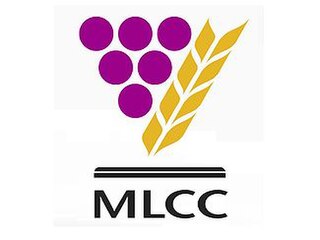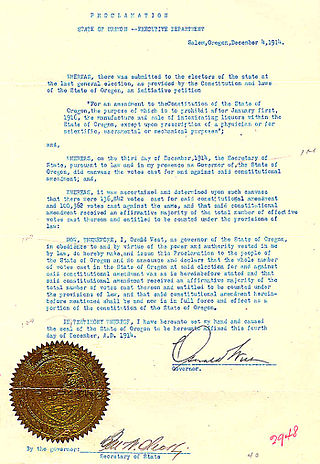
The Oregon Liquor and Cannabis Commission (OLCC), formerly known as the Oregon Liquor Control Commission, is a government agency of the U.S. state of Oregon. The OLCC was created by an act of the Oregon Legislative Assembly in 1933, days after the repeal of prohibition, as a means of providing control over the distribution, sales and consumption of alcoholic beverages. To this end, the agency was given the authority to regulate and license those who manufacture, sell or serve alcohol. Oregon is one of 18 alcoholic beverage control states that directly control the sales of alcoholic beverages in the United States. In 2014, the passage of Oregon Ballot Measure 91 (2014) legalized the recreational use of marijuana in Oregon and gave regulatory authority to the OLCC.
The Pennsylvania Liquor Control Board (PLCB) is an independent government agency that manages the beverage alcohol industry in Pennsylvania by administering the Pennsylvania Liquor Code. It is responsible for licensing the possession, sale, storage, transportation, importation and manufacture of wine, spirits and malt or brewed beverages in the commonwealth, as well as operating a system of liquor distribution (retailing) and providing education about the harmful effects of underage and dangerous drinking.
Alcoholic beverage control states, generally called control states, less often ABC states, are 17 states in the United States that have state monopoly over the wholesaling or retailing of some or all categories of alcoholic beverages, such as beer, wine, and distilled spirits.

The Texas Alcoholic Beverage Commission, or TABC, is a Texas public agency responsible for regulating, inspecting, and taxing the production, sale, and use of alcoholic beverages within the state. The agency was established in 1935 and is headquartered in Austin.

The Manitoba Liquor Control Commission (MLCC) was a Crown corporation mandated with regulating, distributing, and selling beverage alcohol in the Canadian province of Manitoba. In 2014, the Manitoba government merged MLCC with the Manitoba Lotteries Corporation to form the Manitoba Liquor & Lotteries Corporation.

The California Department of Alcoholic Beverage Control (ABC) is a government agency of the state of California that regulates the manufacture, distribution, and sale of alcoholic beverages.

The Alberta Gaming, Liquor and Cannabis Commission (AGLC) is an agency of the government of the Canadian province of Alberta, and regulates alcoholic beverages, recreational cannabis, and gaming-related activities. References to cannabis were added to AGLC's name and governing legislation as cannabis in Canada moved towards legalization in 2018. AGLC was created in 1996 as the Alberta Gaming and Liquor Commission by combining the responsibilities and operations of the Alberta Liquor Control Board (ALCB), Alberta Lotteries, the Alberta Gaming Commission, Alberta Lotteries and Gaming and the Gaming Control Branch. The current Chief Executive Officer as of 2020 is Kandice Machado.

Alcohol Beverage Services, previously known as the Department of Liquor Control is a government agency within the County of Montgomery, Maryland and is the wholesaler of beer, wine and spirits alcoholic beverage throughout the county's 507-square-mile (1,310 km2) area. Montgomery County Department of Liquor Control also exercises control over retail sales for off-premises consumption, either through government-operated package stores or designated agents.
The New Hampshire Liquor Commission is a government agency of the U.S. state of New Hampshire. The commission regulates the sale of alcoholic beverages in New Hampshire, one of 18 alcoholic beverage control states.
The Washington State Liquor and Cannabis Board, formerly the Washington State Liquor Control Board, is an administrative agency of the State of Washington. The Liquor and Cannabis Board is part of the executive branch and reports to the Governor. The board's primary function is the licensing of on and off premises establishments which sell any type of alcohol, and the enforcement and education of the state's alcohol, tobacco, and cannabis laws.

A liquor license is a governmentally issued permit to sell, manufacture, store, or otherwise use alcoholic beverages.

The Delaware Division of Alcohol and Tobacco Enforcement (DATE) is a law enforcement agency of the State of Delaware and is a division of the Delaware Department of Safety and Homeland Security (DSHS).
The Virginia Alcoholic Beverage Control Authority is one of the eleven public safety agencies under the Secretariat of Public Safety and Homeland Security for the Commonwealth. The agency administers the state's ABC laws. ABC stores are the only retail outlets in Virginia where customers may purchase distilled spirits. The profits that Virginia ABC contributes are collected from sales of distilled spirits at ABC stores, taxes collected on beer and wine sales, violation penalties and license fees. Since its establishment in 1934, Virginia ABC has contributed more than $9 billion to the Commonwealth's general fund. Virginia ABC employs more than 4,000 people statewide.

Oklahoma allows any establishment with a beer and wine license to sell beer and wine up to 15% ABV, under refrigeration.

The alcohol laws of Kansas are among the strictest in the United States, in sharp contrast to its neighboring state of Missouri, and similar to its other neighboring state of Oklahoma. Legislation is enforced by the Kansas Division of Alcoholic Beverage Control.
The Liquor Control Commission is an Illinois state government commission, with four divisions.

The U.S. state of Oregon has an extensive history of laws regulating the sale and consumption of alcoholic beverages, dating back to 1844. It has been an alcoholic beverage control state, with the Oregon Liquor and Cannabis Commission holding a monopoly over the sale of all distilled beverages, since Prohibition. Today, there are thriving industries producing beer, wine, and liquor in the state. Alcohol may be purchased between 7 a.m. and 2:30 a.m for consumption at the premise it was sold at, or between 6 a.m. and 2:30 a.m. if it is bought and taken off premise. In 2020, Oregon began allowing the sale of alcohol via home delivery services. As of 2007, consumption of spirits was on the rise while beer consumption held steady. That same year, 11% of beer sold in Oregon was brewed in-state, the highest figure in the United States.

Alcohol laws are laws in relation to the manufacture, use, being under the influence of and sale of alcohol or alcoholic beverages that contains ethanol. Common alcoholic beverages include beer, wine, (hard) cider, and distilled spirits. The United States defines an alcoholic beverage as "any beverage in liquid form which contains not less than one-half of one percent of alcohol by volume", but this definition varies internationally. These laws can restrict those who can produce alcohol, those who can buy it, when one can buy it, labelling and advertising, the types of alcoholic beverage that can be sold, where one can consume it, what activities are prohibited while intoxicated., and where one can buy it. In some cases, laws have even prohibited the use and sale of alcohol entirely, as with Prohibition in the United States from 1920 to 1933.
The alcohol laws of Maine regulate the sale and possession of alcohol in the state of Maine in the United States. Maine is an alcoholic beverage control state.













